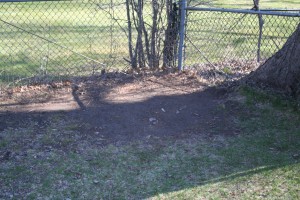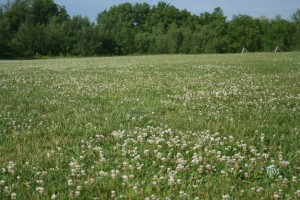A New York law essentially banning pesticide use on the grounds of schools and day care centers has been full effect since 2011. The letter of the law states:
No school or day care shall apply pesticide to any playgrounds, turf, athletic or playing fields, except that an emergency application of a pesticide may be made as determined by the county health department or for a county not having a health department such authority as the county legislature shall designate, the commissioner of health or his or her designee, the commissioner of environmental conservation or his or her designee, or, in the case of a public school, the school board.
Questions about the law still abound. Here are the most common questions we receive:
What areas are affected?

Besides the playgrounds, turf, athletic or playing fields clearly stated in the law, playground equipment and fence lines around athletic fields and tennis courts are included.
The following areas are left to local discretion, but with the understanding that the intent of the law is to reduce children’s exposure to pesticides:
- Areas around buildings
- Ornamental plants such as trees, shrubs, and flowers
Pesticides used inside of schools or day care centers, or to protect a structure, are not banned.
Family day care centers are exempted.
What if a fence line is managed by the surrounding landowner (such as childcare center on a college campus)?
The law applies to the interior fence line that encloses the play area (the side that children may contact). The law would not apply to the exterior fence line.
If a park hosts school athletic events, such as games and practices, must it be managed under the law?
No.
What pesticides are banned and are there any exceptions?
Pesticides are substances intended to prevent, destroy, repel, or mitigate pests. They include insecticides, fungicides, herbicides, rodenticides, and plant growth regulators. All EPA registered pesticides are banned by this law for use on grounds at schools and day care centers, with the following exceptions:
- Antimicrobials such as bleach
- Aerosol sprays (18 ounce or less) to protect from imminent danger from stinging or biting insects
- Insect and rodent baits in non-volatile containers
- Products containing boric acid or disodium octaborate tetrahydrate
- Horticultural oils and soaps
- EPA exempt pesticides, known as minimum risk pesticides and 25(b) products, are not registered by EPA because they find them to pose little or no risk. Cornell has a list of allowable herbicides for schools and day care centers available for your reference.
Note that all of the above exceptions (except bleach) must be applied by a NYS licensed pesticide applicator. Any off label use of a product – such as the use of bleach, road salt, or home remedies to control a pest – is illegal under state law.
Is there a provision within the law to add additional materials to the exempt list?
No. A change would require either the EPA to add to its 25B list or the NYS legislature to pass new legislation.

Can you tell me more about these emergency exemptions?
Under the law, a public school can seek permission for an emergency application from their school board. Non-public schools and day care centers ask the Department of Health in the case of emergencies that threaten public health, such as ticks, or the DEC for those significantly affecting the environment, such as an invasive species.
While the law does not indicate what might be construed as an “emergency”, the Guidance document states pest issues are NOT emergencies if they are:
- manageable with allowed products and practices
- a routine or repetitive pest problem
- purely an aesthetic issue
We are used to dealing with the DEC on pesticide issues. Besides deciding on emergency exemptions for environmental issues on private school and day care grounds, what is their role in the law?
The Department of Environmental Conservation, in consultation with the State Department of Education, State Department of Health, and the Office of Children and Family Services has written guidance for alternative management of turf, but has no role in enforcement.
Where can I find help in managing my grounds without the use of pesticides?
Cornell University is committed to helping you provide safe, functional school and childcare landscapes. The Cornell Turfgrass Program connects you to numerous resources, most notably the Safe Sports Fields Management website and the Lawn Care: The Easiest Steps to an Attractive Environmental Asset ibook. The NYS IPM Program has a dedicated page for schools and childcare centers, including a new blog, The ABCs of School and Childcare Pest Management. We also encourage you to take advantage of educational opportunities throughout the year.